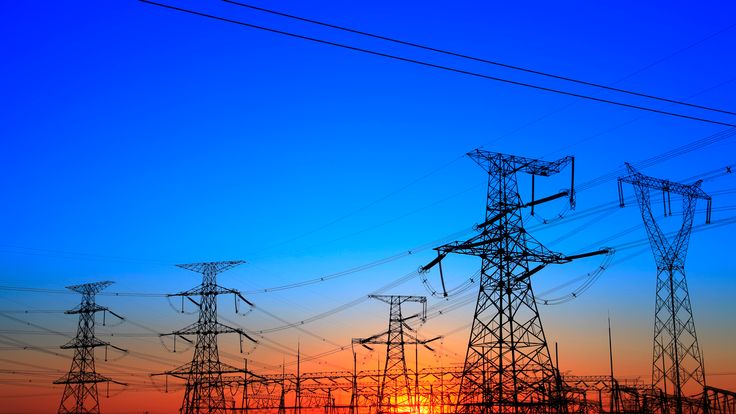Sky Views: Don't switch off… the fall of small energy firms affects us all
Ian King, Business Presenter
You might not have noticed, unless you were one of its 36,000 household customers, but earlier this week the energy supplier One Select went bust.
Its failure came just days after Spark Energy, which had 290,000 customers, went under.
A week earlier, the same fate befell Extra Energy, which had 108,000 household customers and 21,000 business customers.
In all, nine energy suppliers have exited the market this year, with the others including Future Energy, National Gas and Power, Iresa Energy, Gen4U and Usio Energy.
Flow Energy threw in the towel and sold itself while it had the chance.
Together, these businesses had close to three-quarters of a million customers.
It is a fair bet many of them signed with these defunct suppliers having read and heard stories, for years, about how the Big Six – SSE, British Gas, Npower, Eon, EDF and Scottish Power – “rip off” their customers.
The Big Six were routinely shouted down when they patiently tried to explain that, in many cases, their tariffs were more expensive than those of the new challengers because of the cost involved in seeking to fix in advance – hedging in the jargon – the price at which they buy energy in the wholesale markets.
Not many people paid attention when the Big Six tried to point out most of the challenger brands were often much cheaper because they do not hedge substantially against price movements, but buy a significant proportion of their energy on the “spot” market.
This, of course, is a perfectly legitimate business model and it can succeed when the wholesale price of energy is falling and your customer has taken out a fixed-term contract to buy energy from you at a higher price.
But it is disastrous when the spot price soars above the price at which you have agreed to sell them their gas and electricity.
And that is precisely what has happened in some of these cases.
It is easy to forget, given the sharp fall in oil price since early October, that the price of energy has been rising for most of the year.
The price of Brent Crude, a reasonable proxy for wholesale energy prices, rose from $61.77 per barrel on 9 February to $86.29 per barrel on 3 October.
It is no coincidence that most of the company failures described above happened between mid-September and mid-November, before the tumble in wholesale prices could lift them off the rocks.
Many had put off the day of reckoning because most consumers make advance payments or pay by direct debits that even out their bills, effectively overpaying during the summer months when energy consumption is lower, but then underpaying during the winter months of peak consumption.
It is suggested some of the energy companies that went bust this year have been using the credit balances of customers to keep going or even raiding cash resources supposedly earmarked for paying environmental levies.
Indeed, concerns about the health of Spark Energy only came to light when the company missed a £14.4m renewables obligation payment.
Contributing to the failures, no doubt, has been the government’s price cap on standard variable tariffs.
In a commoditised product, like energy, the main factor driving competition is price.
When prices are capped, competitors in the market tend to pitch their prices close to where the price cap has been set, hitting smaller players whose price competitiveness is their key selling point.
Chris Gauld, the chief executive of Spark Energy, said after his company’s failure that the price cap had contributed to its demise.
The collapse of some of these smaller players is distressing to customers – but it hits all of us.
This is for two reasons.
One is that an estimated £50m in renewables obligation fees have gone unpaid due to energy firms skipping payments or going bust before they can make them.
Those costs must ultimately be borne by the rest of the energy industry and their customers.
The second is the process governing what happens when a supplier goes bust.
Ofgem, the energy regulator, operates what is known as a “safety net” procedure in which rival suppliers bid to take on the customers of a bust competitor.
However, when no one comes forward, Ofgem can select another supplier to take on their customers under its “supplier of last resort” process.
When those customers have credit balances with the bust supplier, which must be honoured, the cost of honouring those commitments are spread among other energy customers.
Some have argued that this system incentivises suppliers to wait until a rival has gone bust rather than stepping in beforehand and risk buying a customer base that may not stick with them after transferring.
Consumer groups such as Which? have been complaining about this for some time and Ofgem last month announced it was tightening the rules under which it awards licences to supply energy.
But what it means is that, until now, customers of responsibly-run energy companies are paying for the irresponsibility of others. Economists have an expression for this – moral hazard.
If that phrase sounds familiar, it is because it came to prominence during the financial crisis, when Mervyn King, then governor of the Bank of England, refused to bail out Northern Rock on the basis that it then might encourage excessive risk-taking among other lenders.
The financial crisis taught those who for years had grumbled about “greedy banks” that, if there is one thing worse than a bank making big profits, it is a bank that loses money.
Many people are finding out that it is exactly the same with energy companies.
Sky Views is a series of comment pieces by Sky News editors and correspondents, published every morning.
Previously on Sky Views: Ed Conway: To save economics we need more data
Source: Read Full Article




